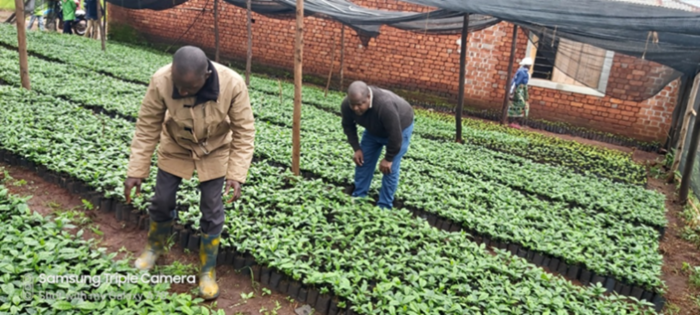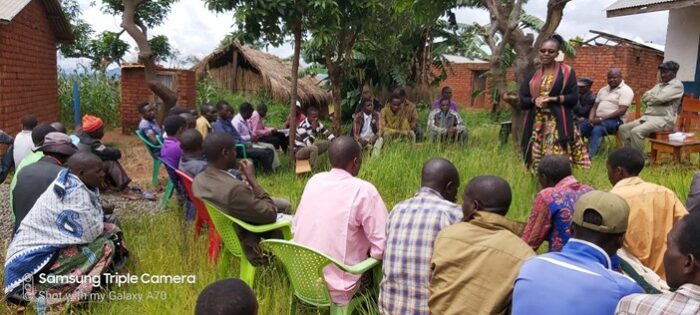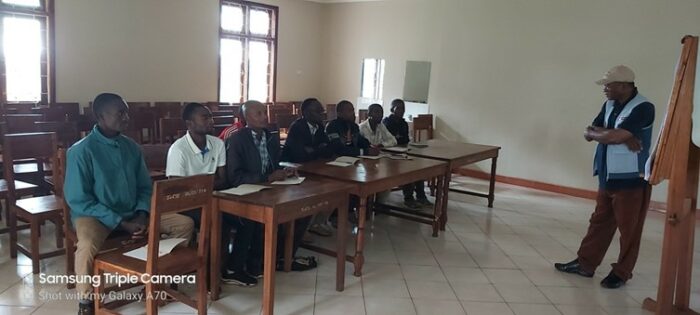CODE-P Project on the impactful work done for smallholder farmers since inception
Date
April 10, 2021
This will enhance incomes and improve nutrition status of 24,000 smallholder farmers in six districts of three regions in the Southern Highlands of Tanzania. Vi Agroforestry implements CODE-P in collaboration with four co-partners, namely, Tanzania Coffee Research Institute (TaCRI), Agricultural None-State Actors Forum (ANSAF), Café Africa and BRAC International.
The project has so far supported and sensitized 32 Agriculture Marketing Cooperative Societies (AMCOS) and 4 youth groups to produce 2,200,788 high-quality coffee seedlings. The project team has sensitized farmers to access and plant improved seedlings from different nurseries near them. A total of 511,690 coffee seedlings have been taken by farmers from the AMCOS nurseries.
 Health check for raised coffee seedlings in one of the AMCOS nursery in Mbinga.
Health check for raised coffee seedlings in one of the AMCOS nursery in Mbinga.
An awareness campaign, led by the district’s nutrition officers, focusing on nutrition has been conducted to 184 beneficiaries from 13 AMCOS. The campaign promoted a balanced diet focusing on nutrient-rich crops such as fruit trees, sweet potatoes, cereals and legumes. The campaign has addressed the importance of balanced meals for pregnant women and young children. The use of vegetables and fruits in every main dish taken and the use of locally available fruits like ripe banana and avocado were highly recommended as they contain a good source of calcium, magnesium and fibre.
 Group photo during farmer training on nutrition awareness campaign led by District Nutrition Officer
Group photo during farmer training on nutrition awareness campaign led by District Nutrition Officer
During the last quarter, a total of 52 lead farmers (30 male and 22 Female) from Ruvuma, Mbeya and Songwe region were trained on Sustainable Land Management (SALM) practices. The emphasis during the training was on soil and water conservations techniques, shade tree planting and canopy management, coffee field layout, seed bed preparation, seeds sowing techniques and transplanting coffee seedlings, fertilizer application rate and proper time of application. The lead farmers are expected to support other farmers in their respective areas on SALM practices.
 Group photo of lead farmers during training sessions on SALM
Group photo of lead farmers during training sessions on SALM
 Group photo of lead farmers during training sessions on SALM
Group photo of lead farmers during training sessions on SALM
A total of 68 farmers from Ruvuma and Mbeya region were trained on agroforestry tree planting for firewood, timber and fruit for nutrition. The training focused on types of timber, fruits and firewood trees with emphasis on proper planting procedures that included spacing of shade and fruits trees. This is to ensure there is enough nutritious fruits as well as enough shade for coffee trees. The trained farmers will be facilitated to establish tree nurseries and to help to disseminate the skills and knowledge to about 2,400 members of AMCOS in their locality on the agroforestry tree planting.
Finally, the capacity training that was delivered to 14 AMCOS; 137 youth; 89 Adult coffee farmers; 2 Coffee inspectors and 16 Extension Officers about gender mainstreaming. The objective of the training was to increase the awareness of the inclusion of gender in all aspects of cooperatives activities in the coffee value chain. The training covered Gender concepts, roles and responsibilities, mainstreaming in the coffee sector and at a coffee cooperative level, addressing gender mainstreaming challenges and inclusion in the coffee value chain and decision making for organizational development.
We are proud of the ongoing work of Vi Agroforestry’s (Tanzania) newest project CODE-P and all the work done so far even with the hindrance of COVID-19. Our team is working hard whilst staying safe and has adapted well to a more remote working style, all the while still doing impactful work as mentioned above.